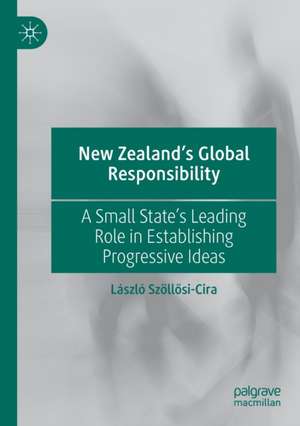New Zealand’s Global Responsibility: A Small State’s Leading Role in Establishing Progressive Ideas
Autor László Szöllősi-Ciraen Limba Engleză Paperback – 23 dec 2022
New Zealand often plays leading roles in implementing progressive ideas. This book investigates what explanatory factors facilitated the country to become such a relevant normative actor. New Zealand’s case suggests that democratic institutions, skilled bureaucracy, and ambitious politicians play the crucial roles to create global influence. The case studies included in this book develop the argument that small states can better influence international politics by focusing on domestic issues. In contributing to discourses on New Zealand’s possible future role, the book is an invaluable resource to intellectuals, researchers, and students alike.
| Toate formatele și edițiile | Preț | Express |
|---|---|---|
| Paperback (1) | 729.77 lei 6-8 săpt. | |
| Springer Nature Singapore – 23 dec 2022 | 729.77 lei 6-8 săpt. | |
| Hardback (1) | 734.17 lei 6-8 săpt. | |
| Springer Nature Singapore – 22 dec 2021 | 734.17 lei 6-8 săpt. |
Preț: 729.77 lei
Preț vechi: 889.97 lei
-18% Nou
Puncte Express: 1095
Preț estimativ în valută:
139.66€ • 145.27$ • 115.30£
139.66€ • 145.27$ • 115.30£
Carte tipărită la comandă
Livrare economică 14-28 aprilie
Preluare comenzi: 021 569.72.76
Specificații
ISBN-13: 9789811673511
ISBN-10: 9811673519
Pagini: 363
Ilustrații: XXI, 363 p. 5 illus., 4 illus. in color.
Dimensiuni: 148 x 210 mm
Greutate: 0.51 kg
Ediția:1st ed. 2022
Editura: Springer Nature Singapore
Colecția Palgrave Macmillan
Locul publicării:Singapore, Singapore
ISBN-10: 9811673519
Pagini: 363
Ilustrații: XXI, 363 p. 5 illus., 4 illus. in color.
Dimensiuni: 148 x 210 mm
Greutate: 0.51 kg
Ediția:1st ed. 2022
Editura: Springer Nature Singapore
Colecția Palgrave Macmillan
Locul publicării:Singapore, Singapore
Cuprins
Chapter 1. Introduction.- Chapter 2. Conceptual framework: progressive norm dynamics in international relations.- Chapter 3. New Zealand as a global policy actor.- Chapter 4. New Zealand’s nuclear-free policy.- Chapter 5. New Zealand’s role in facilitating trade liberalization.- Chapter 6. Discussion: theoretical lessons and New Zealand’s future role.- Chapter 7. Conclusion.
Notă biografică
László Szöllősi-Cira holds a PhD in Politics from the University of Otago. His academic interests include political theory and political economy.
Textul de pe ultima copertă
"László Szöllősi-Cira has written a provocative and timely book. At a time when obsessions about great power conflict dominate International Relations scholarship, Szöllősi-Cira reminds us that smaller powers still have a (sometimes influential) role to play in international politics. Szöllősi-Cira skilfully examines the peculiarities and eccentricities of New Zealand’s foreign policymaking and shows how this relatively small and distant country has managed to remain not only independent but influential. Such insights help contextualize New Zealand’s current foreign policymaking in the face of growing Sino-American competition, making this book an urgent must-read. "
—Nicholas Ross Smith, Assistant Professor, The University of Nottingham, Ningbo, China
“In New Zealand’s Global Responsibility, László Szöllősi-Cira makes the crucial but often overlooked point that New Zealand’s experience challenges the realist assumption that small states are destined to be marginal actors in international relations. Drawing on specific examples concerning the fourth Labour government’s non-nuclear stance and the embrace of trade liberalization in the mid-1980s, this book demonstrates that it is entirely possible for a relatively small state like New Zealand to become a norm setter and ideas entrepreneur in an increasingly interconnected world. This book should be read by both policy-makers and serious students of world affairs.”
—Robert G. Patman, Sesquicentennial Distinguished Chair and Professor of International Relations, University of Otago, New Zealand
New Zealand often plays leading roles in implementing progressive ideas. This book investigates what explanatory factors facilitated the country to become such a relevant normative actor. New Zealand’s case suggests that democratic institutions, skilled bureaucracy, and ambitious politicians play the crucial roles to create global influence. The case studies included in this book develop the argument that small states can better influence international politics by focusing on domestic issues. In contributing to discourses on New Zealand’s possible future role, the book is an invaluable resource to intellectuals, researchers, and students alike.
László Szöllősi-Cira holds a PhD in Politics from the University of Otago. His academic interests include political theory and political economy.
“In New Zealand’s Global Responsibility, László Szöllősi-Cira makes the crucial but often overlooked point that New Zealand’s experience challenges the realist assumption that small states are destined to be marginal actors in international relations. Drawing on specific examples concerning the fourth Labour government’s non-nuclear stance and the embrace of trade liberalization in the mid-1980s, this book demonstrates that it is entirely possible for a relatively small state like New Zealand to become a norm setter and ideas entrepreneur in an increasingly interconnected world. This book should be read by both policy-makers and serious students of world affairs.”
—Robert G. Patman, Sesquicentennial Distinguished Chair and Professor of International Relations, University of Otago, New Zealand
New Zealand often plays leading roles in implementing progressive ideas. This book investigates what explanatory factors facilitated the country to become such a relevant normative actor. New Zealand’s case suggests that democratic institutions, skilled bureaucracy, and ambitious politicians play the crucial roles to create global influence. The case studies included in this book develop the argument that small states can better influence international politics by focusing on domestic issues. In contributing to discourses on New Zealand’s possible future role, the book is an invaluable resource to intellectuals, researchers, and students alike.
László Szöllősi-Cira holds a PhD in Politics from the University of Otago. His academic interests include political theory and political economy.
Caracteristici
Presents a constructivist account of New Zealand’s foreign policy Contributes empirically and theoretically to International Relations scholarship using New Zealand as a case study Focuses on actors’ responsibilities instead of the maximization of actors' power
